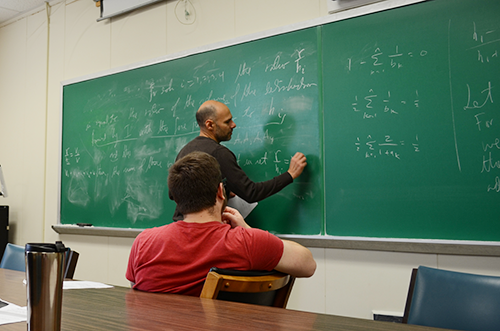Program Highlight: Mathematics Master's and Doctoral Degrees
At UL Lafayette, we offer the master’s and PhD math programs that let you explore applied mathematics, pure mathematics, and statistics so you can refine your knowledge and delve deeper into the beautifully complex field of mathematics.
Earning your master’s or doctorate in mathematics is different from most other disciplines. You won’t spend most of your time in a lab, nor will you spend it writing a book. What you will spend your time doing, however, is taking apart and reassembling the basic foundations of math in order to solidify your understanding of the field. From there, you’ll be able to invent and discover new math and learn how to communicate and share your ideas with your colleagues, future employers, and future students.
As you progress through your curriculum, you’ll get to observe and lead seminars, continue your research, work closely with your advisor, and — most importantly — build your expertise.
So why earn your MS in mathematics or your PhD in mathematics from UL Lafayette? Because you have no other choice but to pursue the work that is most important to you.
“You have to be passionately interested and fully dedicated to it,” says mathematics assistant professor Dr. Chris Rodgers about earning your graduate degree in math. “It’s the only thing that will make you happy if you are that passionate about it.”
MS in Mathematics at UL Lafayette
With a master’s in mathematics, you can choose to study one of our three concentrations (applied math, pure math, and statistics), plus be introduced to independent study and research. A typical timeline to complete your MS in math is two years, but many of our students who earn their master's degree choose to pursue their doctorate in mathematics immediately after.
At this point, once you’ve earned your master’s you’ll be prepared to pursue your PhD, teach math at the secondary or college levels, and use your math foundation for research for private industries or public and governmental organizations.
PhD in Mathematics
Earning your PhD in mathematics will let you really narrow your focus and conduct long-term independent research — also known as inventing new math.
Our doctoral program emphasizes research, preparing our students for the highest levels of scholarship. Having your PhD also opens up career opportunities in academia and research-related fields. At UL Lafayette, you can choose from three concentration areas:
-
Applied Mathematics (including Mathematical Biology, Numerical Analysis, Ordinary Differential Equations, and Partial Differential Equations);

- Pure Mathematics (including Algebra, Analysis, and Topology); and,
- Statistics.
Within the PhD program, you’ll complete a dissertation that covers your research and work as a graduate student. You’ll also get to lead seminars and submit your work to be published, all of which will be about your research.
Practically all of our math graduate students have a teaching assistantship, which covers almost all of their costs as a student. All of our full-time doctoral students receive full financial support their first year — and the median graduate school debt for our doctoral students is $0.
So what will this do for my career?
With a master’s or doctorate in math, you can teach. That may be the most widely known career opportunity, but you can also do so much more.
There are jobs in academia, some of which include teaching. Pretty much any university- or college-level teaching requires a PhD, because you’ll be nurturing the next generation of students who want to pursue their own doctorate or PhD. But at a research university, you’ll also be able to conduct speculative and complex research—and get paid to do it. Having your PhD in math widens your academic opportunities.
With a graduate degree in math, you can also work in government and industry, like with the NSA, Google, Wall Street and the financial sector, and more. For example, one of our math PhD alumni, Peter Xiao, holds 8 U.S. patents and is engineering director at CISCO.
“These companies want creative, focused, brilliant who can problem solve and think outside the box,” said Dr. Rodgers. “In these cases, your specialty isn’t the most important thing.”
Other areas where math graduates work are:
- Astronomy and space exploration;
- Climate studies;
- Medicine;
- National security;
- Robotics; and
- Animated films.